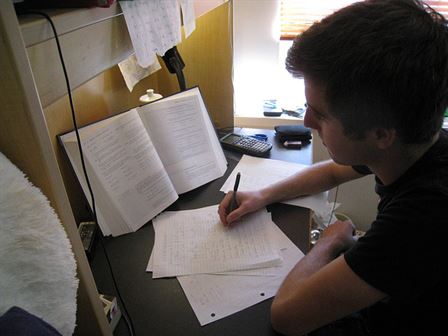Revision, the secret to win the last lapse for Civil Service Preparation

Revision for Civil Service Exam – With the wide expanse of syllabus to be covered, the fear of ‘not covering every topic’ often worries us– and most aspirants end up reading lots and lots of stuff until the last day before the exam. But, they don’t revise the stuff that they have already read. Hence, when they go to the examination hall they lack conviction and clarity on what they have learned and fail to choose a right option with confidence. This results in negative marking. Revision not only strengthens the conceptual and factual information but also helps us in retaining and remembering the right things on time. Revision’s main objective is to improve your confidence levels by many folds.
Also See Article: Art of Making Notes for Civil Service Exam – Part 1
Upon completing the first reading of a really tough book, let’s say Laxmikant, the aspirant is zooming with joy that he now knows the A’s and B’s of polity. But as time passes by, the UPSC aspirant’s retention power or his memory level of a subject goes down so he has to spend more time to re-erect the memory level repeatedly by going through the same thing time and again. But if this act of building up the memory capacity is done in 9-15 days of the 1st reading, it will ensure retention of memory with lesser efforts.
Also See : UPSC Exams
Revision for Civil Service Exam – What is your Study plan ?
Now, the revision plan should go hand in hand with the study plan. The person should not think of completing the course first and then begin the revision; revision means that when an aspirant sits to study for Polity, they should not forget revision of the previous topics. According to the time in one’s hand one should decide a time when he should review the old topics and correlate them with the new information. Spreading out your revision sessions on a particular topic like one-hour sessions for 10 days leads to more efficient learning than spending the same amount of time in one go -10 hours in one day. This phenomenon, known as “spacing”, helps as it allows time in between revision sessions to forget and re-learn the material.
Also See Article: Tabling Time for UPSC Civil Services Success – Tips on Time Management
The best way to memorize information is by making notes over and over again. Read the text book, then make flash cards of the critical concepts and test yourself. It may seem tedious but the thing is that it develops writing and enquiring skills. You develop a thought process which in turn helps in the answer writing process in Mains.
It is often complained that reading the same thing again and again becomes monotonous and boring. Colorful learning maps are a remedy for that. They will help you to memorize facts and develop your interest as well. Revision through mind maps, mnemonics, teaching someone else because it requires you to learn and organise your knowledge in a clear and structured manner, or reading the notes out loud can also be done.
Also See Article: Studying Smart to crack the UPSC Civil Service Exam
Importance of Mock Tests in Revision for Civil Services:
Students, who can test themselves or try to retrieve material from their memory, are going to retain that material better in the long run. Also, knowledge is not enough. You need to be familiar with the type of questions asked. You need to know how to avoid negative marks. You need to know how to increase your probability of marking the right answer. Thus, taking mock tests is essential. Students can get a feel for the types of questions they should expect to see during the test period, and they will also help them understand areas they need to improve on.
Furthermore, with the help of testing modules, students can improve by timing themselves better as they work on questions. Doing these drills will allow students to understand how much time they have to spend on each problem and how much time they are actually spending upon each one. Upon analysing the test result you will at least know what you haven’t prepared well enough, and you are more likely to revise what you already know as well as read on what you have missed when you write a test on the same paper once again. It would be better to improvise in these tests than trying something new before sitting for the real exam. Moreover, the mock tests make the students aware about the areas where they know the most or the best. Then the aspirant can direct his learning to other areas and spend minimal time on the topics they already know. It will help the aspirant in reorganising their revision plan, with time slots free to take up new subjects.
Also See : UPSC Exam Dates
"The more you are accustomed to sitting for a period of time, answering test questions, and pacing yourself, the more comfortable you will feel when you actually sit down to take the test.” -Educational Testing Services
Between you and success is the big wall of Mains, where you will be tested upon how better you express yourself. And if you have been studying very hard, UPSC isn’t going know that unless they read what you have read. So, revise, test, and repeat! Happy preparation!
Author: Anushka Mishra
(C) SuccessCDs.net